An Analysis of Legislation and Ethics in Travel and Tourism Sector
VerifiedAdded on 2021/02/19
|8
|1989
|190
Report
AI Summary
This report provides a comprehensive overview of legislation and ethical considerations within the travel and tourism sector. It begins by defining legislation and ethics, highlighting their importance in regulating the industry. The report then examines various UK legislations, including the Health and Safety at Work Act, Occupiers Liability Act, and Data Protection Act, and their impact on travel businesses. It also addresses equality legislation such as the Sex Discrimination Act, Disability Discrimination Act, and Human Rights Act, emphasizing their role in ensuring fair treatment of employees and customers. Furthermore, the report explores business ethics, ethical dilemmas, and Corporate Social Responsibility (CSR) in the context of travel and tourism, with examples from Virgin Holidays. It discusses sustainability, accountability, and corporate governance, concluding with a summary of key findings and a list of references.
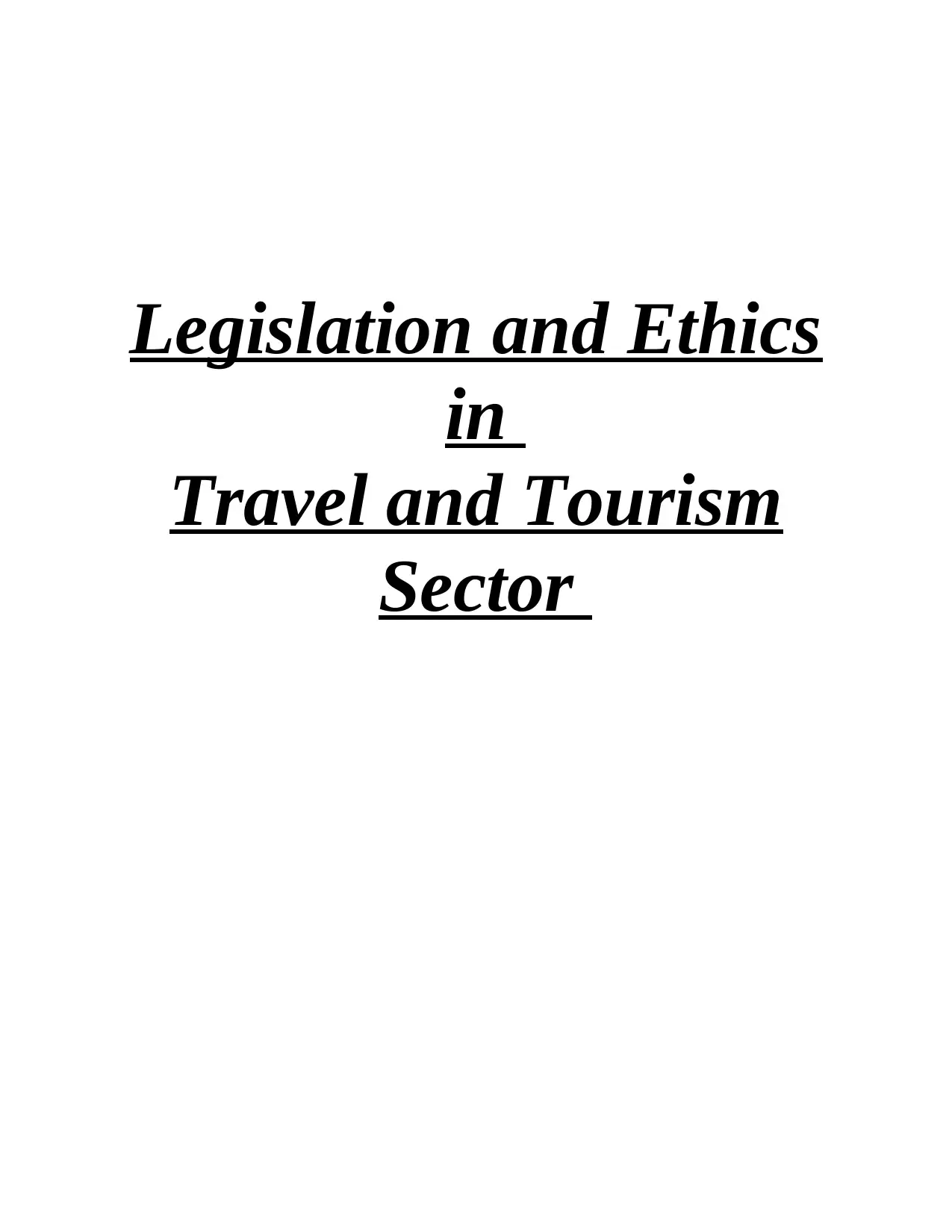
Legislation and Ethics
in
Travel and Tourism
Sector
in
Travel and Tourism
Sector
Paraphrase This Document
Need a fresh take? Get an instant paraphrase of this document with our AI Paraphraser
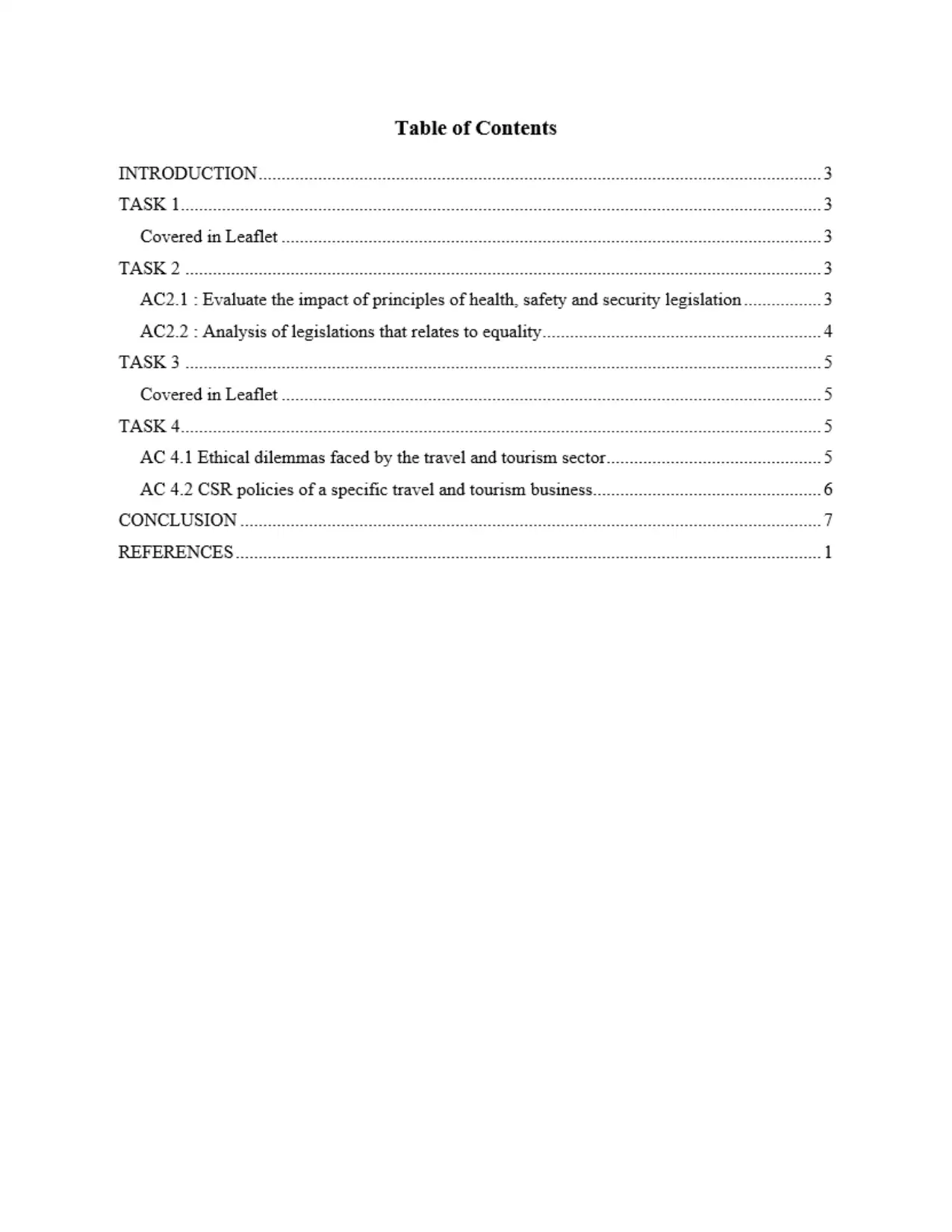
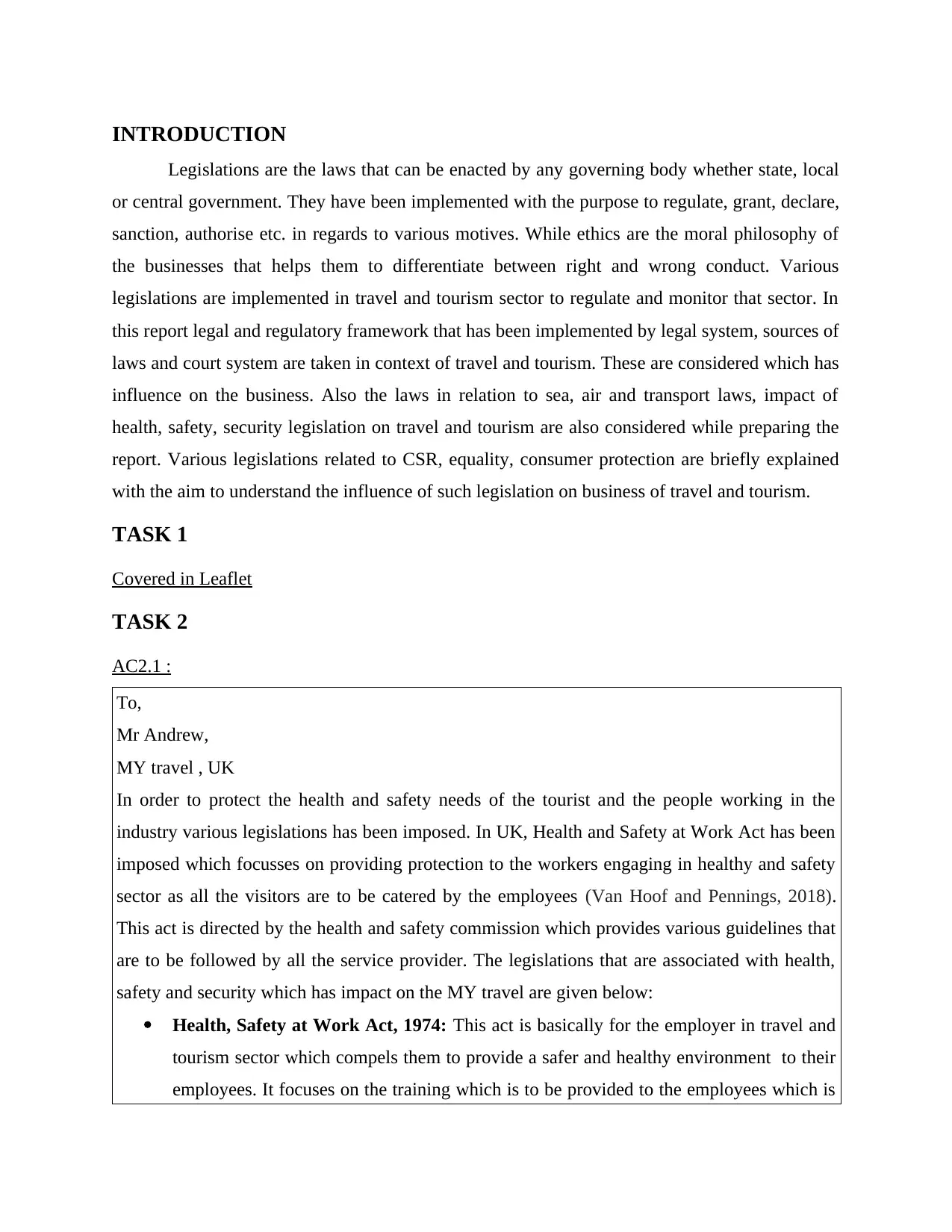
INTRODUCTION
Legislations are the laws that can be enacted by any governing body whether state, local
or central government. They have been implemented with the purpose to regulate, grant, declare,
sanction, authorise etc. in regards to various motives. While ethics are the moral philosophy of
the businesses that helps them to differentiate between right and wrong conduct. Various
legislations are implemented in travel and tourism sector to regulate and monitor that sector. In
this report legal and regulatory framework that has been implemented by legal system, sources of
laws and court system are taken in context of travel and tourism. These are considered which has
influence on the business. Also the laws in relation to sea, air and transport laws, impact of
health, safety, security legislation on travel and tourism are also considered while preparing the
report. Various legislations related to CSR, equality, consumer protection are briefly explained
with the aim to understand the influence of such legislation on business of travel and tourism.
TASK 1
Covered in Leaflet
TASK 2
AC2.1 :
To,
Mr Andrew,
MY travel , UK
In order to protect the health and safety needs of the tourist and the people working in the
industry various legislations has been imposed. In UK, Health and Safety at Work Act has been
imposed which focusses on providing protection to the workers engaging in healthy and safety
sector as all the visitors are to be catered by the employees (Van Hoof and Pennings, 2018).
This act is directed by the health and safety commission which provides various guidelines that
are to be followed by all the service provider. The legislations that are associated with health,
safety and security which has impact on the MY travel are given below:
Health, Safety at Work Act, 1974: This act is basically for the employer in travel and
tourism sector which compels them to provide a safer and healthy environment to their
employees. It focuses on the training which is to be provided to the employees which is
Legislations are the laws that can be enacted by any governing body whether state, local
or central government. They have been implemented with the purpose to regulate, grant, declare,
sanction, authorise etc. in regards to various motives. While ethics are the moral philosophy of
the businesses that helps them to differentiate between right and wrong conduct. Various
legislations are implemented in travel and tourism sector to regulate and monitor that sector. In
this report legal and regulatory framework that has been implemented by legal system, sources of
laws and court system are taken in context of travel and tourism. These are considered which has
influence on the business. Also the laws in relation to sea, air and transport laws, impact of
health, safety, security legislation on travel and tourism are also considered while preparing the
report. Various legislations related to CSR, equality, consumer protection are briefly explained
with the aim to understand the influence of such legislation on business of travel and tourism.
TASK 1
Covered in Leaflet
TASK 2
AC2.1 :
To,
Mr Andrew,
MY travel , UK
In order to protect the health and safety needs of the tourist and the people working in the
industry various legislations has been imposed. In UK, Health and Safety at Work Act has been
imposed which focusses on providing protection to the workers engaging in healthy and safety
sector as all the visitors are to be catered by the employees (Van Hoof and Pennings, 2018).
This act is directed by the health and safety commission which provides various guidelines that
are to be followed by all the service provider. The legislations that are associated with health,
safety and security which has impact on the MY travel are given below:
Health, Safety at Work Act, 1974: This act is basically for the employer in travel and
tourism sector which compels them to provide a safer and healthy environment to their
employees. It focuses on the training which is to be provided to the employees which is
⊘ This is a preview!⊘
Do you want full access?
Subscribe today to unlock all pages.

Trusted by 1+ million students worldwide
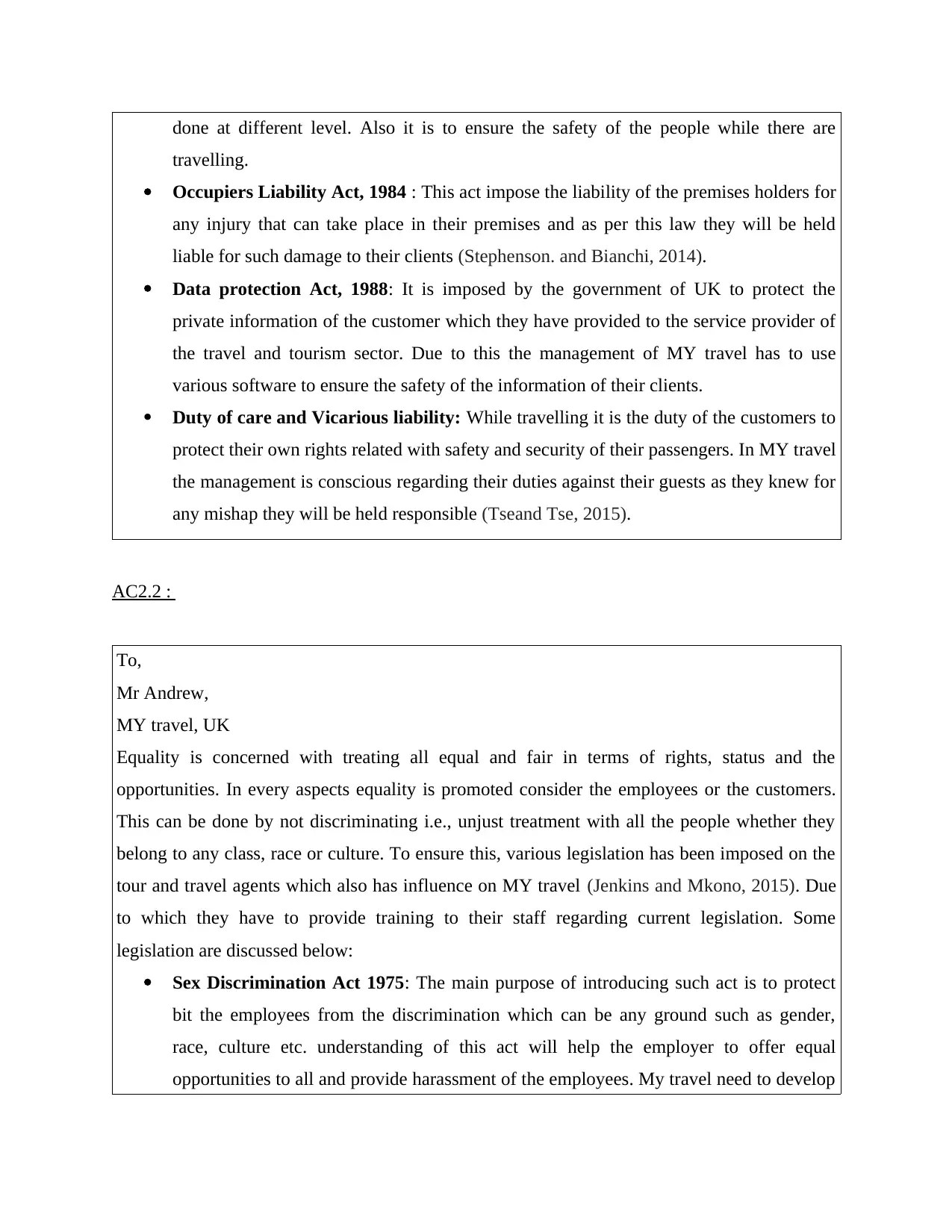
done at different level. Also it is to ensure the safety of the people while there are
travelling.
Occupiers Liability Act, 1984 : This act impose the liability of the premises holders for
any injury that can take place in their premises and as per this law they will be held
liable for such damage to their clients (Stephenson. and Bianchi, 2014).
Data protection Act, 1988: It is imposed by the government of UK to protect the
private information of the customer which they have provided to the service provider of
the travel and tourism sector. Due to this the management of MY travel has to use
various software to ensure the safety of the information of their clients.
Duty of care and Vicarious liability: While travelling it is the duty of the customers to
protect their own rights related with safety and security of their passengers. In MY travel
the management is conscious regarding their duties against their guests as they knew for
any mishap they will be held responsible (Tseand Tse, 2015).
AC2.2 :
To,
Mr Andrew,
MY travel, UK
Equality is concerned with treating all equal and fair in terms of rights, status and the
opportunities. In every aspects equality is promoted consider the employees or the customers.
This can be done by not discriminating i.e., unjust treatment with all the people whether they
belong to any class, race or culture. To ensure this, various legislation has been imposed on the
tour and travel agents which also has influence on MY travel (Jenkins and Mkono, 2015). Due
to which they have to provide training to their staff regarding current legislation. Some
legislation are discussed below:
Sex Discrimination Act 1975: The main purpose of introducing such act is to protect
bit the employees from the discrimination which can be any ground such as gender,
race, culture etc. understanding of this act will help the employer to offer equal
opportunities to all and provide harassment of the employees. My travel need to develop
travelling.
Occupiers Liability Act, 1984 : This act impose the liability of the premises holders for
any injury that can take place in their premises and as per this law they will be held
liable for such damage to their clients (Stephenson. and Bianchi, 2014).
Data protection Act, 1988: It is imposed by the government of UK to protect the
private information of the customer which they have provided to the service provider of
the travel and tourism sector. Due to this the management of MY travel has to use
various software to ensure the safety of the information of their clients.
Duty of care and Vicarious liability: While travelling it is the duty of the customers to
protect their own rights related with safety and security of their passengers. In MY travel
the management is conscious regarding their duties against their guests as they knew for
any mishap they will be held responsible (Tseand Tse, 2015).
AC2.2 :
To,
Mr Andrew,
MY travel, UK
Equality is concerned with treating all equal and fair in terms of rights, status and the
opportunities. In every aspects equality is promoted consider the employees or the customers.
This can be done by not discriminating i.e., unjust treatment with all the people whether they
belong to any class, race or culture. To ensure this, various legislation has been imposed on the
tour and travel agents which also has influence on MY travel (Jenkins and Mkono, 2015). Due
to which they have to provide training to their staff regarding current legislation. Some
legislation are discussed below:
Sex Discrimination Act 1975: The main purpose of introducing such act is to protect
bit the employees from the discrimination which can be any ground such as gender,
race, culture etc. understanding of this act will help the employer to offer equal
opportunities to all and provide harassment of the employees. My travel need to develop
Paraphrase This Document
Need a fresh take? Get an instant paraphrase of this document with our AI Paraphraser
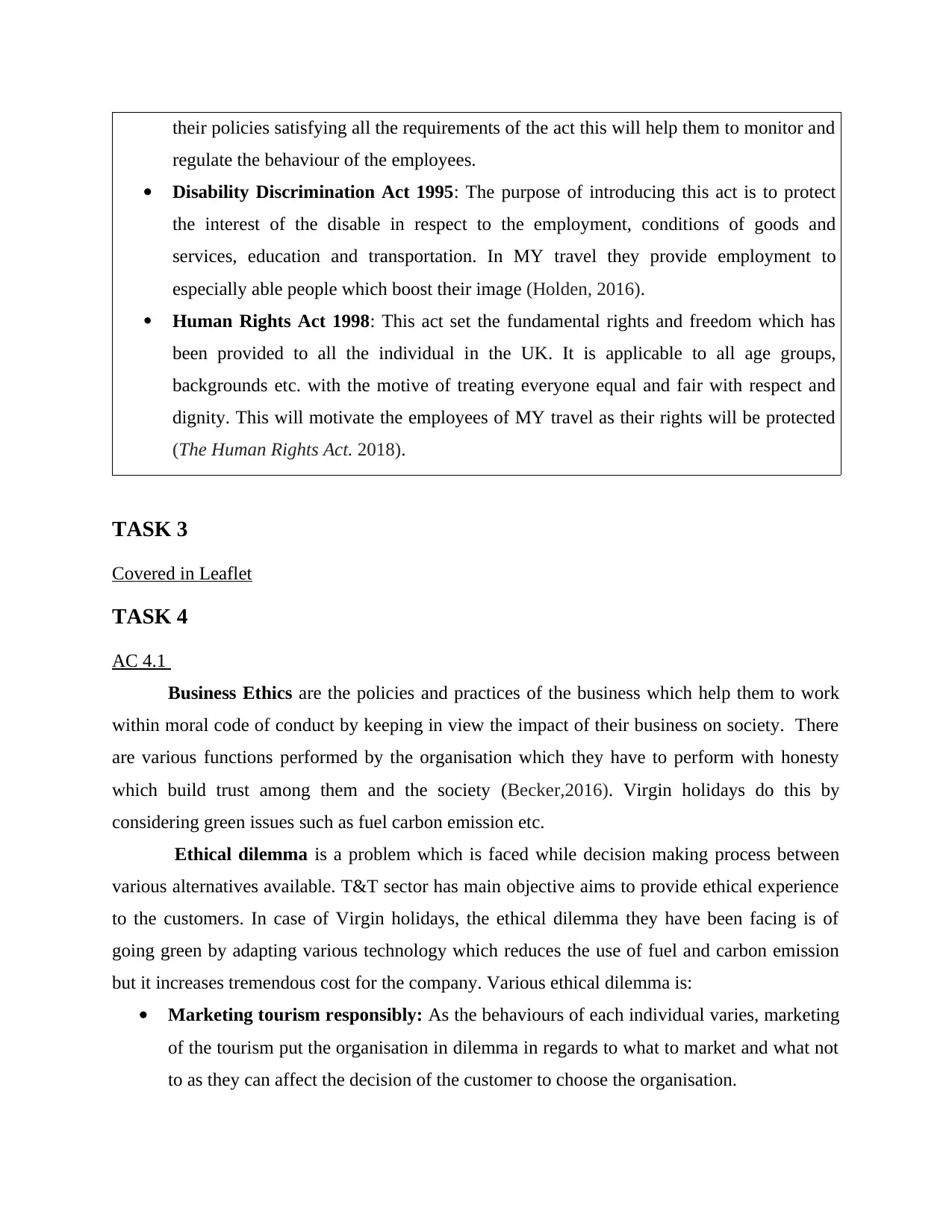
their policies satisfying all the requirements of the act this will help them to monitor and
regulate the behaviour of the employees.
Disability Discrimination Act 1995: The purpose of introducing this act is to protect
the interest of the disable in respect to the employment, conditions of goods and
services, education and transportation. In MY travel they provide employment to
especially able people which boost their image (Holden, 2016).
Human Rights Act 1998: This act set the fundamental rights and freedom which has
been provided to all the individual in the UK. It is applicable to all age groups,
backgrounds etc. with the motive of treating everyone equal and fair with respect and
dignity. This will motivate the employees of MY travel as their rights will be protected
(The Human Rights Act. 2018).
TASK 3
Covered in Leaflet
TASK 4
AC 4.1
Business Ethics are the policies and practices of the business which help them to work
within moral code of conduct by keeping in view the impact of their business on society. There
are various functions performed by the organisation which they have to perform with honesty
which build trust among them and the society (Becker,2016). Virgin holidays do this by
considering green issues such as fuel carbon emission etc.
Ethical dilemma is a problem which is faced while decision making process between
various alternatives available. T&T sector has main objective aims to provide ethical experience
to the customers. In case of Virgin holidays, the ethical dilemma they have been facing is of
going green by adapting various technology which reduces the use of fuel and carbon emission
but it increases tremendous cost for the company. Various ethical dilemma is:
Marketing tourism responsibly: As the behaviours of each individual varies, marketing
of the tourism put the organisation in dilemma in regards to what to market and what not
to as they can affect the decision of the customer to choose the organisation.
regulate the behaviour of the employees.
Disability Discrimination Act 1995: The purpose of introducing this act is to protect
the interest of the disable in respect to the employment, conditions of goods and
services, education and transportation. In MY travel they provide employment to
especially able people which boost their image (Holden, 2016).
Human Rights Act 1998: This act set the fundamental rights and freedom which has
been provided to all the individual in the UK. It is applicable to all age groups,
backgrounds etc. with the motive of treating everyone equal and fair with respect and
dignity. This will motivate the employees of MY travel as their rights will be protected
(The Human Rights Act. 2018).
TASK 3
Covered in Leaflet
TASK 4
AC 4.1
Business Ethics are the policies and practices of the business which help them to work
within moral code of conduct by keeping in view the impact of their business on society. There
are various functions performed by the organisation which they have to perform with honesty
which build trust among them and the society (Becker,2016). Virgin holidays do this by
considering green issues such as fuel carbon emission etc.
Ethical dilemma is a problem which is faced while decision making process between
various alternatives available. T&T sector has main objective aims to provide ethical experience
to the customers. In case of Virgin holidays, the ethical dilemma they have been facing is of
going green by adapting various technology which reduces the use of fuel and carbon emission
but it increases tremendous cost for the company. Various ethical dilemma is:
Marketing tourism responsibly: As the behaviours of each individual varies, marketing
of the tourism put the organisation in dilemma in regards to what to market and what not
to as they can affect the decision of the customer to choose the organisation.
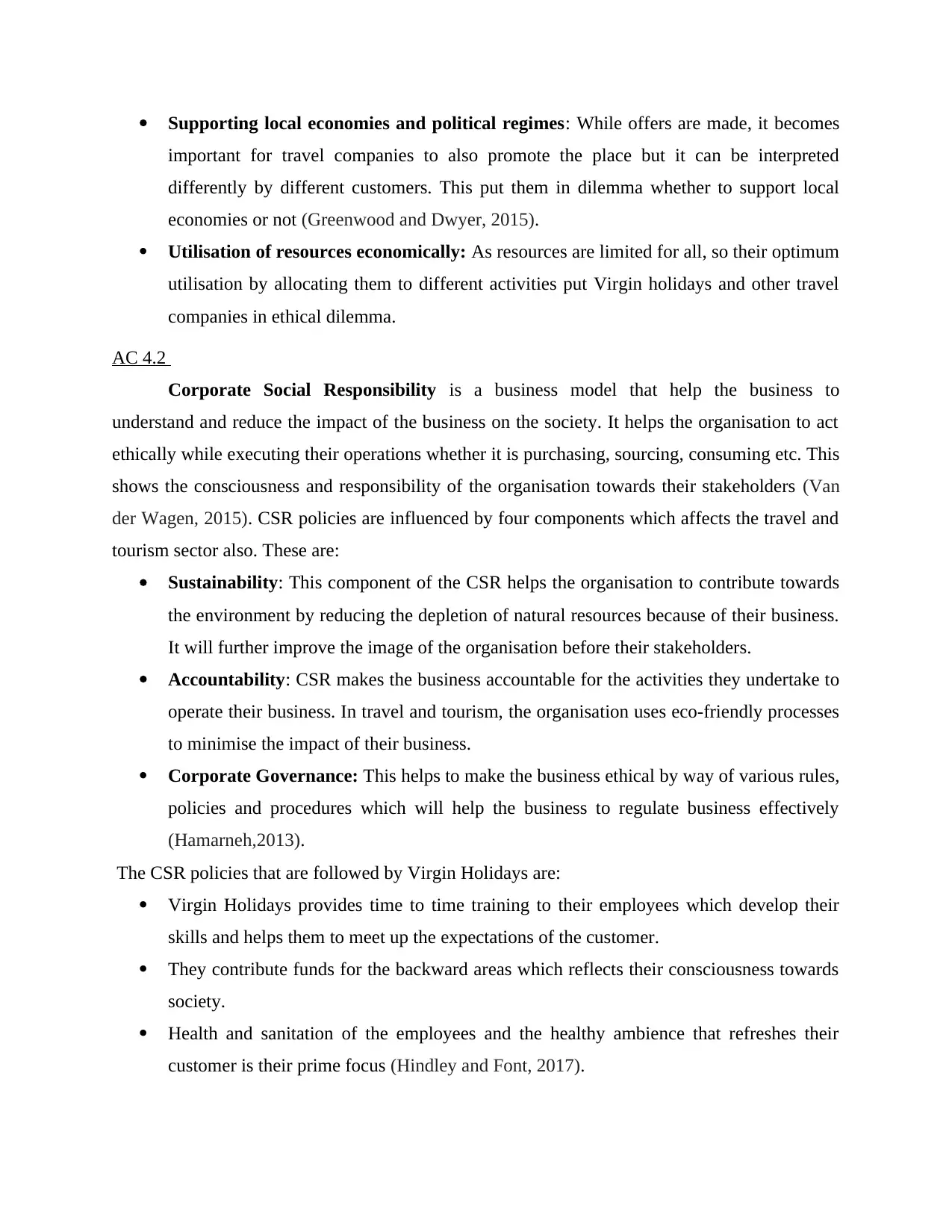
Supporting local economies and political regimes: While offers are made, it becomes
important for travel companies to also promote the place but it can be interpreted
differently by different customers. This put them in dilemma whether to support local
economies or not (Greenwood and Dwyer, 2015).
Utilisation of resources economically: As resources are limited for all, so their optimum
utilisation by allocating them to different activities put Virgin holidays and other travel
companies in ethical dilemma.
AC 4.2
Corporate Social Responsibility is a business model that help the business to
understand and reduce the impact of the business on the society. It helps the organisation to act
ethically while executing their operations whether it is purchasing, sourcing, consuming etc. This
shows the consciousness and responsibility of the organisation towards their stakeholders (Van
der Wagen, 2015). CSR policies are influenced by four components which affects the travel and
tourism sector also. These are:
Sustainability: This component of the CSR helps the organisation to contribute towards
the environment by reducing the depletion of natural resources because of their business.
It will further improve the image of the organisation before their stakeholders.
Accountability: CSR makes the business accountable for the activities they undertake to
operate their business. In travel and tourism, the organisation uses eco-friendly processes
to minimise the impact of their business.
Corporate Governance: This helps to make the business ethical by way of various rules,
policies and procedures which will help the business to regulate business effectively
(Hamarneh,2013).
The CSR policies that are followed by Virgin Holidays are:
Virgin Holidays provides time to time training to their employees which develop their
skills and helps them to meet up the expectations of the customer.
They contribute funds for the backward areas which reflects their consciousness towards
society.
Health and sanitation of the employees and the healthy ambience that refreshes their
customer is their prime focus (Hindley and Font, 2017).
important for travel companies to also promote the place but it can be interpreted
differently by different customers. This put them in dilemma whether to support local
economies or not (Greenwood and Dwyer, 2015).
Utilisation of resources economically: As resources are limited for all, so their optimum
utilisation by allocating them to different activities put Virgin holidays and other travel
companies in ethical dilemma.
AC 4.2
Corporate Social Responsibility is a business model that help the business to
understand and reduce the impact of the business on the society. It helps the organisation to act
ethically while executing their operations whether it is purchasing, sourcing, consuming etc. This
shows the consciousness and responsibility of the organisation towards their stakeholders (Van
der Wagen, 2015). CSR policies are influenced by four components which affects the travel and
tourism sector also. These are:
Sustainability: This component of the CSR helps the organisation to contribute towards
the environment by reducing the depletion of natural resources because of their business.
It will further improve the image of the organisation before their stakeholders.
Accountability: CSR makes the business accountable for the activities they undertake to
operate their business. In travel and tourism, the organisation uses eco-friendly processes
to minimise the impact of their business.
Corporate Governance: This helps to make the business ethical by way of various rules,
policies and procedures which will help the business to regulate business effectively
(Hamarneh,2013).
The CSR policies that are followed by Virgin Holidays are:
Virgin Holidays provides time to time training to their employees which develop their
skills and helps them to meet up the expectations of the customer.
They contribute funds for the backward areas which reflects their consciousness towards
society.
Health and sanitation of the employees and the healthy ambience that refreshes their
customer is their prime focus (Hindley and Font, 2017).
⊘ This is a preview!⊘
Do you want full access?
Subscribe today to unlock all pages.

Trusted by 1+ million students worldwide
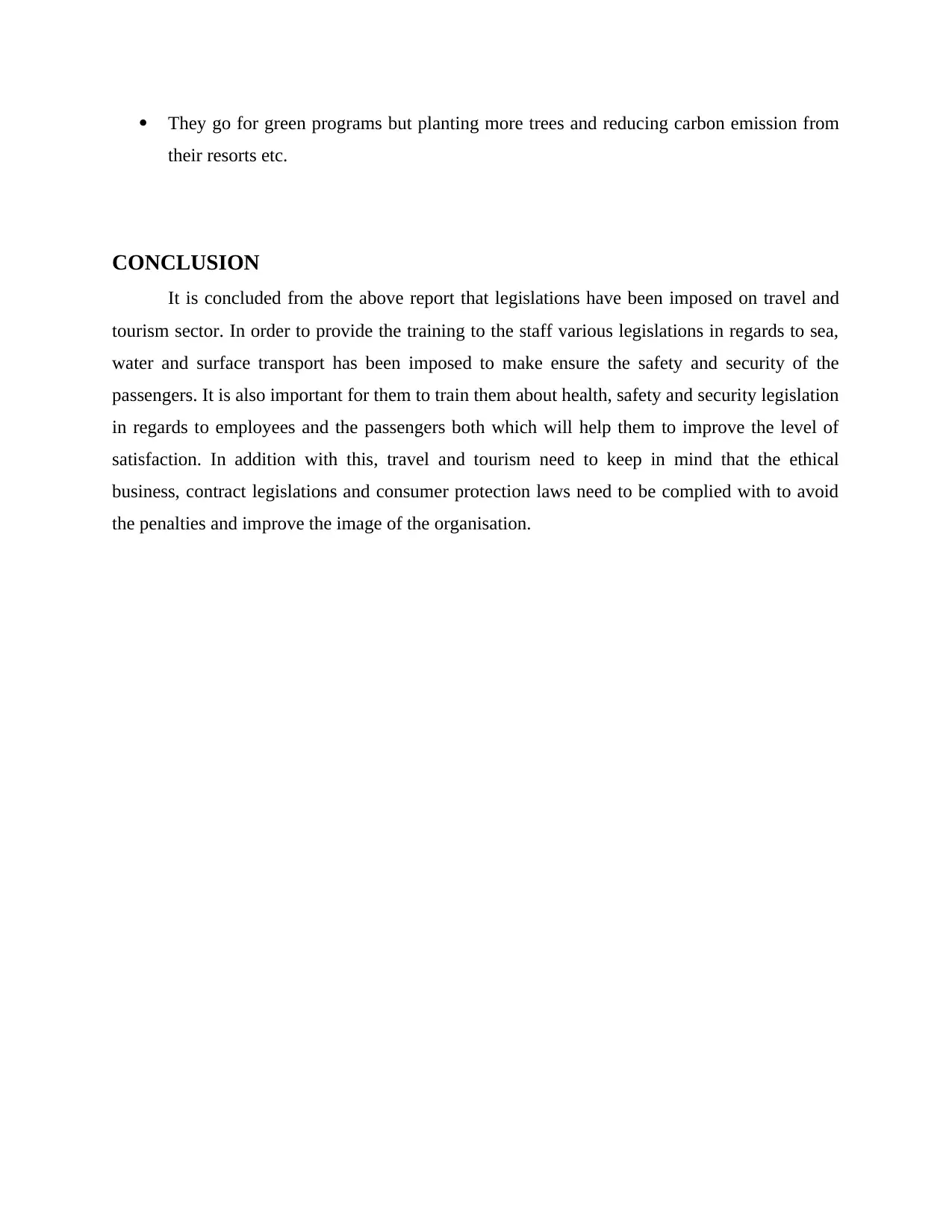
They go for green programs but planting more trees and reducing carbon emission from
their resorts etc.
CONCLUSION
It is concluded from the above report that legislations have been imposed on travel and
tourism sector. In order to provide the training to the staff various legislations in regards to sea,
water and surface transport has been imposed to make ensure the safety and security of the
passengers. It is also important for them to train them about health, safety and security legislation
in regards to employees and the passengers both which will help them to improve the level of
satisfaction. In addition with this, travel and tourism need to keep in mind that the ethical
business, contract legislations and consumer protection laws need to be complied with to avoid
the penalties and improve the image of the organisation.
their resorts etc.
CONCLUSION
It is concluded from the above report that legislations have been imposed on travel and
tourism sector. In order to provide the training to the staff various legislations in regards to sea,
water and surface transport has been imposed to make ensure the safety and security of the
passengers. It is also important for them to train them about health, safety and security legislation
in regards to employees and the passengers both which will help them to improve the level of
satisfaction. In addition with this, travel and tourism need to keep in mind that the ethical
business, contract legislations and consumer protection laws need to be complied with to avoid
the penalties and improve the image of the organisation.
Paraphrase This Document
Need a fresh take? Get an instant paraphrase of this document with our AI Paraphraser
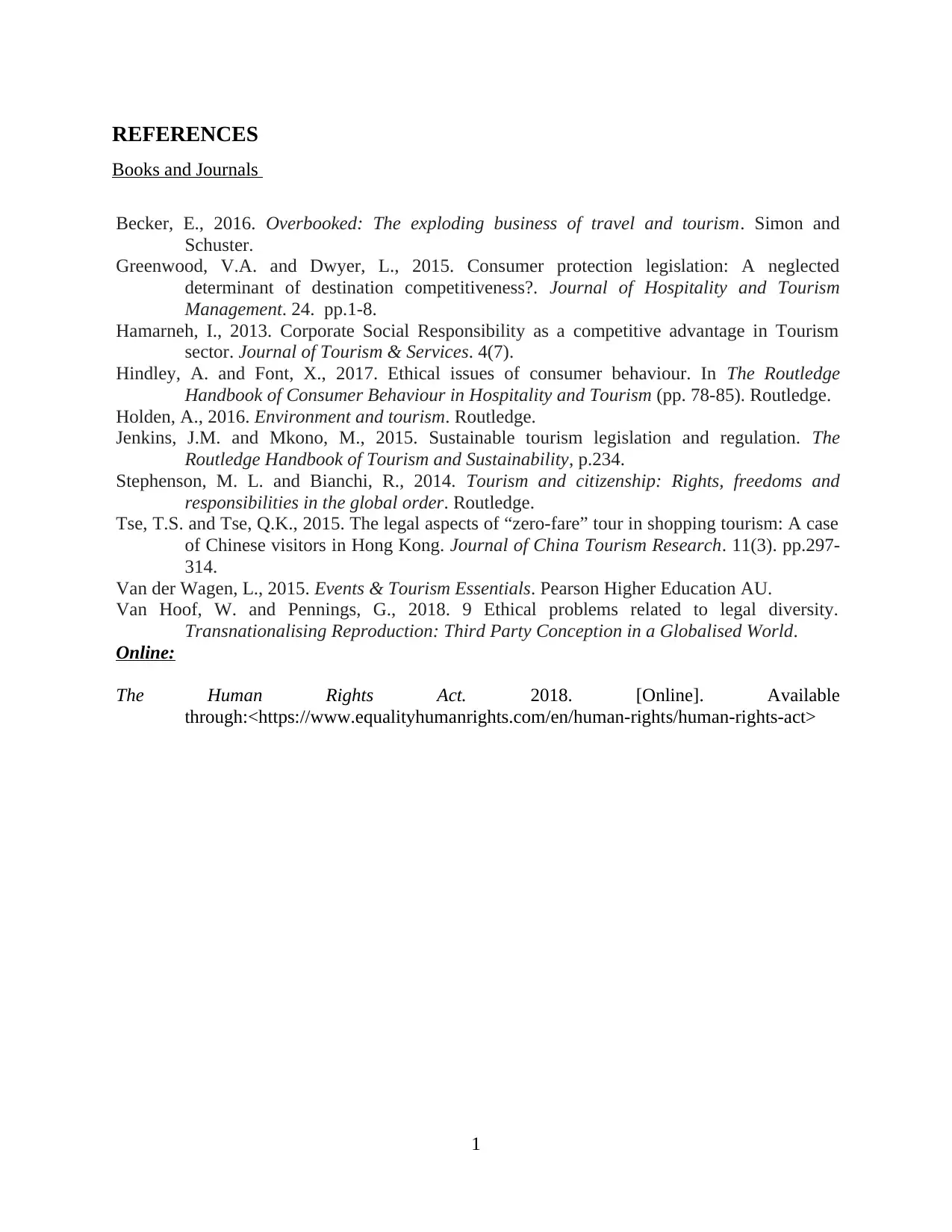
REFERENCES
Books and Journals
Becker, E., 2016. Overbooked: The exploding business of travel and tourism. Simon and
Schuster.
Greenwood, V.A. and Dwyer, L., 2015. Consumer protection legislation: A neglected
determinant of destination competitiveness?. Journal of Hospitality and Tourism
Management. 24. pp.1-8.
Hamarneh, I., 2013. Corporate Social Responsibility as a competitive advantage in Tourism
sector. Journal of Tourism & Services. 4(7).
Hindley, A. and Font, X., 2017. Ethical issues of consumer behaviour. In The Routledge
Handbook of Consumer Behaviour in Hospitality and Tourism (pp. 78-85). Routledge.
Holden, A., 2016. Environment and tourism. Routledge.
Jenkins, J.M. and Mkono, M., 2015. Sustainable tourism legislation and regulation. The
Routledge Handbook of Tourism and Sustainability, p.234.
Stephenson, M. L. and Bianchi, R., 2014. Tourism and citizenship: Rights, freedoms and
responsibilities in the global order. Routledge.
Tse, T.S. and Tse, Q.K., 2015. The legal aspects of “zero-fare” tour in shopping tourism: A case
of Chinese visitors in Hong Kong. Journal of China Tourism Research. 11(3). pp.297-
314.
Van der Wagen, L., 2015. Events & Tourism Essentials. Pearson Higher Education AU.
Van Hoof, W. and Pennings, G., 2018. 9 Ethical problems related to legal diversity.
Transnationalising Reproduction: Third Party Conception in a Globalised World.
Online:
The Human Rights Act. 2018. [Online]. Available
through:<https://www.equalityhumanrights.com/en/human-rights/human-rights-act>
1
Books and Journals
Becker, E., 2016. Overbooked: The exploding business of travel and tourism. Simon and
Schuster.
Greenwood, V.A. and Dwyer, L., 2015. Consumer protection legislation: A neglected
determinant of destination competitiveness?. Journal of Hospitality and Tourism
Management. 24. pp.1-8.
Hamarneh, I., 2013. Corporate Social Responsibility as a competitive advantage in Tourism
sector. Journal of Tourism & Services. 4(7).
Hindley, A. and Font, X., 2017. Ethical issues of consumer behaviour. In The Routledge
Handbook of Consumer Behaviour in Hospitality and Tourism (pp. 78-85). Routledge.
Holden, A., 2016. Environment and tourism. Routledge.
Jenkins, J.M. and Mkono, M., 2015. Sustainable tourism legislation and regulation. The
Routledge Handbook of Tourism and Sustainability, p.234.
Stephenson, M. L. and Bianchi, R., 2014. Tourism and citizenship: Rights, freedoms and
responsibilities in the global order. Routledge.
Tse, T.S. and Tse, Q.K., 2015. The legal aspects of “zero-fare” tour in shopping tourism: A case
of Chinese visitors in Hong Kong. Journal of China Tourism Research. 11(3). pp.297-
314.
Van der Wagen, L., 2015. Events & Tourism Essentials. Pearson Higher Education AU.
Van Hoof, W. and Pennings, G., 2018. 9 Ethical problems related to legal diversity.
Transnationalising Reproduction: Third Party Conception in a Globalised World.
Online:
The Human Rights Act. 2018. [Online]. Available
through:<https://www.equalityhumanrights.com/en/human-rights/human-rights-act>
1
1 out of 8
Related Documents
Your All-in-One AI-Powered Toolkit for Academic Success.
+13062052269
info@desklib.com
Available 24*7 on WhatsApp / Email
![[object Object]](/_next/static/media/star-bottom.7253800d.svg)
Unlock your academic potential
Copyright © 2020–2026 A2Z Services. All Rights Reserved. Developed and managed by ZUCOL.





